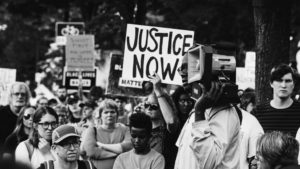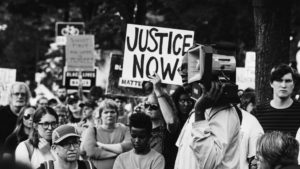May 24, 2019
 Rochester-based organizations and community groups today released a new report that comprehensively outlines continued racial disparities in marijuana enforcement in the City of Rochester and Monroe County.
Rochester-based organizations and community groups today released a new report that comprehensively outlines continued racial disparities in marijuana enforcement in the City of Rochester and Monroe County.
According to the report, which is based on data from the state Division of Criminal Justice Services from 2010 to 2018, the vast majority of people arrested for low-level marijuana possession in the City of Rochester were Black (81%) — despite the fact that there are comparable numbers of Black and white residents living in Rochester and government reports consistently show that black and white people consume marijuana at similar rates.
The new report also documents how Monroe County has one of the highest arrest rates for low-level marijuana-related offenses in New York State: Monroe ranks fifth-highest by county for low-level marijuana possession (outside of NYC). For every one white person arrested for low-level marijuana possession in Monroe County, there are four Black people arrested for that charge, despite white people comprising the majority population in the county and comparable rates of use.
This report comes as Assembly Majority Leader Crystal Peoples-Stokes and the Senate Finance Committee Chair Liz Krueger are working to pass the Marijuana Regulation and Taxation Act (S.1527/A.1617) this year, which would include legalizing and regulating cannabis for adult-use in New York, centered in justice and equity for victims of the War on Drugs.
This legislation has the potential to boost New York State’s economy by potentially creating a $1.7 to $3.5 billion industry that focuses on local businesses and creates total employment between 30,700 and 43,400 employees. At the same time, the bill would redirect tax revenue from a legal industry towards various programs that redress harms from the War on Drugs, while also increasing and improving public education and treatment programs geared towards responsible use, reducing overdoses, and saving lives.
 Leading Rochester organizations Roc NORML, Metro Justice, and VOCAL-NY have been working in Rochester and Albany to raise the extreme racial disparities in marijuana policing and organizing to change local policies, including working with the Rochester City Council, which released a letter in support of marijuana legalization and justice and urged state representatives to take action.
Leading Rochester organizations Roc NORML, Metro Justice, and VOCAL-NY have been working in Rochester and Albany to raise the extreme racial disparities in marijuana policing and organizing to change local policies, including working with the Rochester City Council, which released a letter in support of marijuana legalization and justice and urged state representatives to take action.
The leaders say it’s time to stop the ineffective and unjust enforcement of marijuana prohibition and to bring an end once and for all to the ongoing harms that marijuana prohibition causes families – while also reinvesting tax revenue in the communities that have been most harmed.
Advocates point to how in the face of extreme racial disparities in arrests, the mayors of NYC and Buffalo chose to end or de-prioritize low-level marijuana possession related arrests. District Attorneys in NYC, Syracuse, Albany, Buffalo, and Westchester, and more have said they should stop prosecuting these offenses.
Unfortunately, Mayor Warren of Rochester and District Attorney Doorley of Monroe County haven’t taken any of these actions. The City of Rochester police department is still arresting for low-level marijuana possession, and the District Attorney’s office is still prosecuting for these offenses. These numbers speak for themselves and with Rochester being the third largest city in New York, it’s time we join the rest of the state in advancing marijuana justice.
The Rochester advocacy groups are hosting a series of community education and outreach events to mobilize support for immediately passing the Marijuana Regulation and Taxation Act (S.1527/A.1617), known as MRTA, this legislative session in Albany.
The Marijuana Regulation and Taxation Act will better serve community well-being, equity, justice, and public health across New York by:
- Regulating cannabis and creating a system to tax and regulate marijuana in a manner similar to alcohol for adults over the age of 21.
- Clearing prior cannabis-related criminal records and addressing additional devastating impacts of marijuana criminalization in the fields of immigration, family law, housing, and employment.
- Protecting youth – particularly young people of color, who continue to be disproportionately impacted – by both eliminating a common reason for introduction to the criminal justice system and preventing access to marijuana through a regulated market.
- Safeguarding safety and public health through advertising restrictions, stringent quality control, harm reduction options, and public education.
- Creating tax revenue that will be directed to repairing the harm caused by the war on drugs, school-based prevention efforts, job training, and youth development programming.
- Establishing a licensing structure designed to create a favorable environment for small businesses and family-scale farmers, which creates space for entrepreneurial efforts to be launched in small towns and rural areas, as well as disproportionately impacted communities across the state.
Despite New York’s Marihuana Reform Act of 1977 that decriminalized low-level marijuana possession, there have been more than 800,000 arrests made in the last 20 years in the state.
Statewide in 2018, Black and Latinx people comprised of 81.3% of all low-level marijuana arrests, despite making up 34.5% of the state’s population. The impact of criminal convictions on educational, employment, and other life opportunities – especially for young people, who comprise nearly two-thirds of all low-level marijuana arrests, despite being only one-third of the state population — can be severe, even for minor marijuana offenses.
Racial disparities in marijuana enforcement continue to be extreme across the state as well. In 2017, in the main upstate cities, black people were 12.1 times more likely to be arrested for marijuana possession than white people; Latino people were 6.4 times more likely. In the rest of the state in 2017 (outside of NYC and the main Upstate cities), black people were 11.2 times more likely to be arrested while Latino people were 5.2 times more likely. Additionally, in upstate cities the number of marijuana arrests resulting in a jail sentence increased from 9.8 percent to 17.8 percent in 2016.
The only way to begin to unravel this legacy of disparate impact is to move marijuana into a fully regulated market at the state level.
If you would like more information about this topic, please contact Mary Kruger at 585-469-6731, or email at rocnorml@rocnorml.org.











